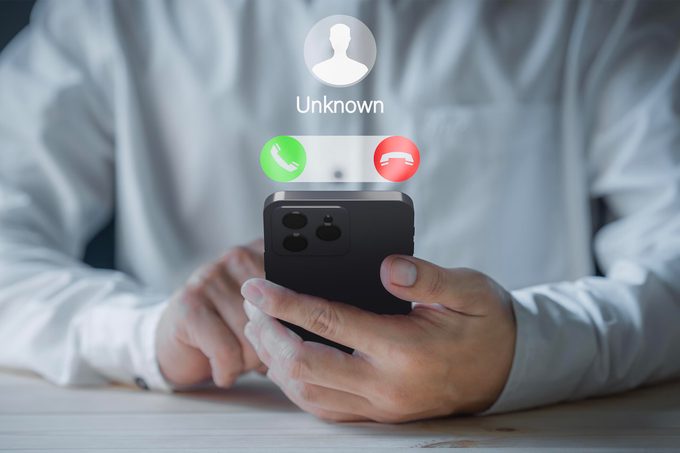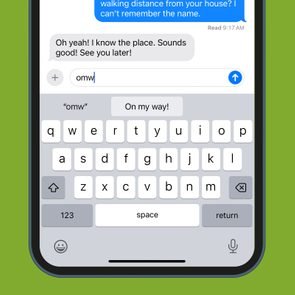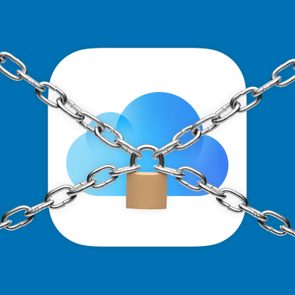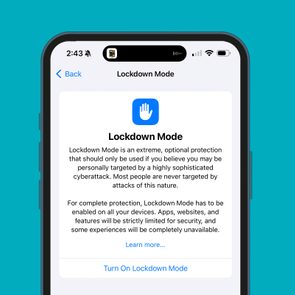Experts decode the difference between "Unknown Caller" and "No Caller ID"—and explain why you should never call them back

Here’s Why You Should Never Call Back Unknown Numbers

It never fails: Just as you sit down to enjoy a nice meal with the family, your phone rings. Sigh. Even more annoying is the fact that a glance at your smartphone screen doesn’t show who’s calling. “The reality is that 70% of Americans say they receive multiple calls from unknown numbers every week,” says Hari Ravichandran, founder and CEO of Aura, a cybersecurity company that offers digital safety solutions, including a feature that blocks spam calls. So why should you never call back unknown numbers, and do “Unknown Caller” and “No Caller ID” mean the same thing?
Not quite. But each type of call could be an attempt to defraud you. “Phone scams are not only frustrating but can also lead to financial loss,” he says. “Every year, phone scams cost Americans millions in lost money—not to mention hundreds of millions of wasted hours.”
To help you deal with unknown callers and missed call phone scams, I talked to two experts on privacy, security and telecommunications fraud. Read on to learn why you should never call back unknown numbers and the differences between Unknown Caller and No Caller ID. Get the experts’ top tech tips for dealing with (and protecting yourself from) anonymous calls.
Get Reader’s Digest’s Read Up newsletter for more tech, travel, humor and fun facts all week long.
What does Unknown Caller mean?
As you might expect, Unknown Caller appears on your phone when your mobile phone provider doesn’t recognize the person trying to reach you. (Note: AT&T no longer uses the term Unknown Caller because, the company says, the terminology was confusing to some customers. When using the free AT&T ActiveArmor app to screen calls, you’ll now see “Private Caller” when the caller does not provide a number and name.)
Unknown Caller doesn’t necessarily mean the call is coming from a phone scammer, but you have every right to be suspicious. While a network error could prevent your provider from identifying the caller, so could certain tech. The caller may be using a prepaid phone, a phone that is not registered with the phone company or a spoofing service that allows them to disguise a phone number so that it appears to be coming from a different number.
What does No Caller ID mean?
If your ringing phone flashes the phrase No Caller ID, it’s safe to say the person calling you has intentionally blocked their phone number from being displayed. “The caller chooses to hide their identity, which is often a feature used for privacy but can also be exploited by scammers,” explains Ravichandran.
No Caller ID vs. Unknown Caller: What’s the difference?
While similar in that you don’t know who’s calling you, No Caller ID (or Private Caller) and Unknown Caller are not interchangeable terms.
To best understand the differences, think about the terms at their most basic level. What does Unknown Caller mean? Your phone provider doesn’t know who’s calling you. Though the words may put you on alert, they don’t indicate the caller’s intentions.
The phrase No Caller ID does, however. When you see that, it tells you the caller has purposefully hidden their number.
What happens if you call back an unknown number?
Calling back unknown numbers might expose you to phone scammers. The rise in missed call scams, phone call phishing and impersonation scams is why most security experts recommend never calling back unknown numbers. A better idea: Search for the number online to see if it’s linked to any scams instead of calling back immediately.
Another risk you need to be wary of when faced with a missed call from an unknown number is potential identity theft. If you call the number back, the scammer might try to coax you into making an impulsive decision that’ll help them steal your private data.
How should you handle an unknown call?
There are a few easy things you can do to minimize unknown call dangers and to mitigate the risk of falling victim to phishing phone calls. According to the experts, taking the steps below is a smart place to start.
Let it go to voicemail
Return a call from an unknown or blocked number, Ravichandran says, and you might become the target of a phone scam or phishing attack. “Scammers seek personal information like banking details or Social Security numbers, and answering [or returning] such calls creates urgency and makes it easier for scammers to keep you engaged compared to other communication methods,” he says.
Even if you answer the phone or return the call only to tell the person to stop ringing your number, you put yourself at risk. When you respond to their calls, you essentially tell fraudsters that your phone number is active. That can potentially lead to further calls by the same perpetrator or to the scammer selling your number as part of a list to another fraudster.
Other scary alternatives involve a four-word phone scam that can use a simple response from you to commit fraud.
“The bottom line is: When in doubt, let it go to voicemail and wait to hear if it’s a legitimate caller,” says Ravichandran.
Keep your guard up
If you’ve already answered a call flagged as Unknown Caller or No Caller ID, maintain a hefty dose of skepticism to avoid falling prey to a scam. “Phone scammers operate the same way as email or text message scammers—they use ‘social engineering’ to try and manipulate you for information or money,” says Valerie Scheder, AT&T’s vice president of global fraud management. “They try to catch you off guard, and they may try to create a false sense of urgency, so remember to keep your guard up and realize this can happen to me.”
Double-check the source
“If you receive a call that claims to be from a legitimate organization but seems suspicious, hang up and call the organization back using a number you trust,” says Ravichandran. That’s a smart plan regardless of whether you see Unknown Caller, No Caller ID or the name of a recognizable business light up your phone screen. If it sounds sketchy, it probably is.
“Scammers can manipulate caller ID information to make it appear as if the call is coming from a trusted source, such as a government agency or a familiar business,” he says. “This can increase the likelihood of the recipient answering the call.”
How can you block and avoid scam calls?
Whether you use an iPhone or Android device, Scheder advises adjusting your smartphone’s settings to silence or block unknown numbers. Keep reading to find out how to do that.
Silence unknown callers on an iPhone:

- Open “Settings.”
- Tap “Phone.”
- Tap “Silence Unknown Callers.”
- Toggle this to “on.”
Once you’ve turned this setting on, your phone will automatically silence calls from unknown numbers and send them to voicemail. They’ll appear in your recent calls list.
Block unknown callers on a Samsung phone:

- Open the Phone app.
- Tap the three vertical dots in the top right.
- Choose “Settings.”
- Tap “Block numbers.”
- Toggle on “Block unknown callers.”
Block unknown callers on a Google phone:
- Open the Phone app.
- Tap the three vertical dots in the top right.
- Choose “Settings.”
- Tap “Block numbers.”
- Turn on “Unknown.”
Once that’s turned on, your phone will block calls from private numbers—those that would’ve appeared as No Caller ID. Don’t worry: You’ll still get calls from known numbers that aren’t in your contacts.
Use an app that blocks calls
If spam calls have you at your wit’s end, it may be time to download an app designed to stop unknown callers in their tracks. “AT&T customers can use the free AT&T ActiveArmor mobile security app to manage incoming callers that have chosen to block their number and name, which we label Private Caller,” says Scheder. “You can allow, block or send these calls directly to voicemail with a single setting.”
Other providers have similar security apps, such as T-Mobile’s Scam Shield and Verizon’s Call Filter.
“Activate spam-blocking features provided by your mobile carrier or use third-party apps like Aura’s AI-powered call assistant,” says Ravichandran. “These tools can identify and block calls from known scam numbers, alert you to potential spam and even provide additional security features like VPN [virtual private network] and reverse number lookup.”
Sign up for the Do Not Call Registry
Registering your phone with the Federal Trade Commission (FTC) National Do Not Call Registry won’t stop scammers who don’t honor and abide by this list, but it will stop legitimate companies from getting through.
Plus, the do-not-call list gives valuable information to the FTC, such as the time of the call, the business name and phone number, and more.
FAQs
Should I be worried about an unknown caller?
A call from an unknown number isn’t always a reason to worry—not all unknown callers are scammers. But it pays to play it safe, so when an unknown number is calling, let it go to voicemail. If it’s important, the person will leave a message, and you can then give them a call back after ascertaining their identity.
What does Unknown Caller mean for those who pick up the phone or those who call back immediately? There’s a risk you’re being scammed, so you must have your guard up. Fraudsters may claim to be from your bank, the IRS, a popular store, a courier company or your internet provider, but that doesn’t mean they are.
Use common sense. If someone says they’re from a retailer and the offer sounds too good to be true, it probably is.
Can you find an unknown caller’s number?
It’s only natural to be curious when you get a missed call from an unknown number, but discovering the person behind your mysterious call can be a hit-or-miss process. Ideally, you should never call back unknown numbers; there are, however, a couple of things you can try:
- Dial *69: Doing this after the call comes in may show you the caller’s number and maybe their name. Depending on the cellphone provider, you may be able to dial the caller back. Note: If the service doesn’t automatically activate after you type *69, press the Call button. Using *69 is usually free.
- Dial *57: This lets you trace the phone number of an incoming call. The service is meant for harassing calls that warrant law enforcement or legal action, so if you don’t intend to take legal action, use *69. If the service doesn’t automatically activate after dialing *57, press the Call button. Follow any instructions provided by the voice recording. Using *57 may not be free, so check with your provider first.
- Try a third-party app: Some apps, like TrapCall and Truecaller, may allow you to find an unknown number. Pro tip: Try the free version first to see if it works before unnecessarily paying for an app (or a premium tier of an app).
How can you protect yourself from unknown calls?
Ravichandran says the rise of more complex technology, including AI, has resulted in scammers getting more creative and sophisticated with their methods. “False phone calls sound eerily authentic, leveraging a wealth of information readily available to criminals, and so remember to be vigilant about who you’re talking to and what you’re sharing,” he says.
As someone with 30 years of experience as a technology journalist and author of tech books, let me offer another tip that won’t just save you from scammers but will also save you time: Some people like to mess with scammers by calling back and keeping them on the phone for a long time, pretending to fall for the pitch. Your intention may be to waste the scammer’s time and upset them by not falling for it, but whoever is reviewing the phone logs may simply see a long call, which could imply the scammer almost got you. Now your number may graduate to an even more valuable list and may invite many more calls.
Let the call go to voicemail, and don’t call back or just hang up if you’ve already answered the call.
About the experts
|
Why trust us
Reader’s Digest has published hundreds of articles on personal technology, arming readers with the knowledge to protect themselves against cybersecurity threats and internet scams as well as revealing the best tips, tricks and shortcuts for computers, cellphones, apps, texting, social media and more. For this piece, Marc Saltzman tapped his 30-year experience as a technology journalist, author of several books (including Apple Vision Pro for Dummies) and host of the syndicated “Tech It Out” radio show and podcast. Then Burton Kelso, the owner of tech-repair company Integral and a technology expert with more than 30 years of experience, gave it a rigorous review to ensure that all information is accurate and offers the best possible advice to readers. We rely on credentialed experts with personal experience and know-how as well as primary sources including tech companies, professional organizations and academic institutions. We verify all facts and data and revisit them over time to ensure they remain accurate and up to date. Read more about our team, our contributors and our editorial policies.
Sources:
- Hari Ravichandran, founder and CEO of Aura; audio interview, May 1, 2024; email interview, May 7, 2024
- Valerie Scheder, vice president of global fraud management at AT&T; email interview, May 8, 2024
- Federal Trade Commission: “Fraud Reports”
- Apple: “Detect and block spam phone calls”
- Samsung: “How to block certain incoming calls on your Galaxy phone”
- Google: “Block or unblock a phone number”
- AT&T: “ActiveArmor”
- T-Mobile: “Scam Shield”
- Verizon: “Call Filter”
- Aura: “Spam Call Protection”























